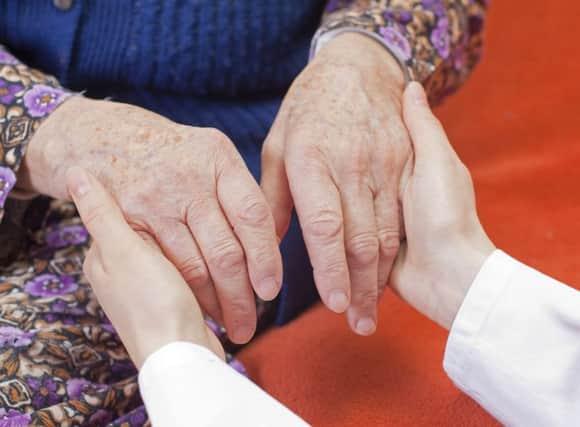Giving elderly and disabled a hand can improve the lives of their carers


One of the most significant pieces of legislative work that faces MSPs after the summer recess will be the Carers (Scotland) Bill, which promises to be a game-changer for the way we support those looking after the most vulnerable people in Scotland.
According to the Scottish Health Survey there are an estimated 745,000 adult carers and 44,000 young carers in Scotland, each of whom look after a dependent or relative who relies upon them. The value of the care they provide is estimated to be around £10.3 billion each year, yet 17 per cent of the population aged over 16 is estimated to provide some sort of unpaid care, many working full time without financial or moral support.
Advertisement
Hide AdAdvertisement
Hide AdWith an ageing population, combined with stretched public finances, there will always be an expanding number of people needing care support, particularly in their own homes. The Carers (Scotland) Bill is one way that the Scottish Government is aiming to help alleviate some of the burden currently on the shoulders of carers young and old, by ensuring they get access to a range of support, particularly from local authorities.
The costs of these measures are expected to be significant, rising to nearly £90 million a year by 2021, and there is concern that councils, already struggling to balance budgets, will struggle to foot the bill.
That’s an issue that MSPs will work through in the year ahead but I am convinced that solutions can be found to square the circle of affording proper support for older and disabled people, while also looking after the local heroes that give their time and energy to support vulnerable loved ones.
Caring can have a detrimental effect on the health and wellbeing of a carer and this can have a knock-on impact on the person being cared for. So part of the business case for investing in carers will be about reaping the savings that result from getting better outcomes for them – by ensuring that they have the support to take care of their own health needs and find the time to enter education, training and employment. Another crucial aspect of getting it right for carers is to ensure that we maximise the opportunities that exist with health and social care integration. At its most basic level, integration is about ensuring that service users and carers experience better, more joined up services. That involves creating structures to allow public service providers to work together to help our most vulnerable people continue to live independently and safely in their own homes for as long as possible.
Like other third sector organisations, Care and Repair Edinburgh is gearing up to meet the challenge of helping public service providers do more with less for older and disabled people in the Capital. Currently in our 30th year, we’re a charity which provides a range of practical services and advice to assist older and disabled people to live more independently in their own homes. Our services include a trusted volunteer handyperson service, a home-from-hospital adaptation service, small repairs and home improvements, as well as safe referrals to vetted professional tradespeople.
Our volunteers help because they know they can change lives – even in their lunch break. However much, or little, spare time people have, it makes such a difference to an older person to have the support. By carrying out odd jobs, DIY or even something as simple as changing a light bulb, being a volunteer can enable older people to stay at home, retain independence and know they have help at hand. And as well as providing direct assistance to vulnerable people, the volunteers also provide huge peace of mind to carers, helping them to help loved ones by taking some of the burden from essential odd-jobs and joinery. By volunteering to help improve lives, our volunteers give NHS and local authority service providers an essential additional resource. Indeed, the average cost of keeping someone for a week in an acute hospital is £4,600, but often they can’t leave because they need minor alterations at home to help them to live there safely. Yet a week of care in a home setting is just £300 to £400, and Care and Repair Edinburgh can make sure that transition happens quickly, smoothly and cheaply.
The sums add up to confirm that more support like that offered by Care and Repair Edinburgh is not just desirable, but becoming increasingly essential to sustainable health and social care delivery across Scotland.
• Graham Harper is chief executive of care and repair Edinburgh, www.careandrepairedinburgh.org.uk